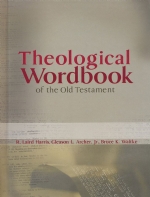$37.99
If you are already a Laridian customer, log in above and we can tell you if you own this product.
Preview Contents
Preview the table of contents and a limited selection of text from the books in this collection.
 Theological Wordbook of the Old Testament
Theological Wordbook of the Old Testament

Theological Wordbook of the Old Testament
$37.99
Buy It Once, Use It On These Platforms
Description
The Theological Wordbook of the Old Testament offers extensive, scholarly discussion of every Hebrew word of theological significance in the Old Testament.
The Theological Wordbook is essentially a Hebrew lexicon. It is intended to be a ready tool for the pastor and the serious student who want to study carefully and understand more fully the sacred text. However, certain special features also make it useful for those less at home in the Hebrew language.
Words are indexed first by their root; the verbal root and derived words are discussed together. All the derivatives are also listed in proper alphabetical position with a convenient numerical cross reference to lead you to the verbal root where, if it is theologically important, a discussion of the meaning of the root and all its derivatives will be found.
Your purchase of the Theological Wordbook includes the King James Version Bible with Strong's numbers because some words are also indexed by their Strong's Number. For those words, you can simply choose a Strong's number in PocketBible to view the definition for that word. Or if you already own a PocketBible Bible that includes Strong's numbers, you can link to the definitions in the Theological Wordbook by choosing the Strong's numbers included with those Bible texts. (Please note that not all Strong's numbers will have a corresponding definition in the Theological Wordbook).
Features
- In-depth explanations of Hebrew words of important theological significance
- One-line definitions of all other Hebrew words used in the Old Testament based on Brown, Driver and Briggs Hebrew and English Lexicon of the Old Testament. It was decided not to include the Old Testament names, except for a few of special theological import, like Abraham, Jerusalem, etc.
- FREE BONUS! Includes King James Version text with Strong's numbers so you can readily access definitions where there is one available for that number.
From the Introduction
"The busy pastor or earnest Christian worker who has neither the time nor background for detailed technical study should yet have a tool for the study of the significant theological words of the Hebrew Bible...therefore, about thirteen years ago, they [the editors and publisher, Moody Press] enlisted the help of some forty evangelical scholars who would write essay definitions of the important theological terms in the Old Testament that would be helpful to their brothers in the work of interpreting Scripture."
Sample Text
Definition for Hebrew word assigned to Strong's number 2208: murder, slay, kill. (2208a) shattering(Ps 42:11; Eze 21:27).
This is a purely Hebrew term. It has no clear cognate in any of the contemporary tongues. The root occurs thirty-eight times in the OT, with fourteen occurrences in Nu 35. The initial use of the root appears in the Ten Commandments (Ex 20:13). In that important text it appears in the simple Qal stem with the negative adverb, “You shall not murder,” being a more precise reading than the too-general KJV "thou shalt not kill." Much has been made of the fact that the root appears in the Mosaic legislation, as though this term bore a special connotation of premeditation, as though the Decalogue only proscribed premeditated crime. This is not the case, The many occurrences in Nu 35 deal with the organization of the six cities of refuge to which manslayers who killed a person accidentally could flee. Nu 35:11 makes completely clear that the refuge was for those guilty of unpremeditated, accidental killings. This makes clear that the word applies equally to both cases of premeditated murder and killings as a result of any other circumstances, what English Common Law has called, "man slaughter." The root also describes killing for revenge (Nu 35:27,30) and assassination (2Ki 6:32). It appears in a few poetic contexts, as an "A" word in a peculiar parallel construction (Job 24:14); as an "A" word parallel to a general term for immorality, zimma (Ho 6:9); as a "B" word parallel to another synonym "to kill," "to slay" (Ps 94:6). In only one case in the whole OT is the root used of the killing of man by an animal (Pr 22:13). But even in that context it is the enormity and horror of the deed which is primary. In all other cases of the use of this word, it is man's crime against man and God's censure of it which is uppermost.
(NOTE: Actual definition in PocketBible includes Hebrew characters for word being defined.)
About the Editor(s)
Gleason L. Archer (B.A., M.A., Ph.D., Harvard University; B.D., Princeton Theological Seminary; L.L.B., Suffolk Law School) is professor emeritus of Old Testament and Semitic languages at Trinity Evangelical Divinity School, in Deerfield, Illinois. He continues to teach part time at TEDS and has served as a minister of the Evangelical Free Church of America since 1966. Archer's books include Job: God's Answer to Undeserved Suffering and Old Testament Quotations in the New Testament. His instrumental work in the preparation of the Old Testament portion of the New American Standard Bible has gained wide acclaim and positioned him as a world-renowned scholar.
R. Laird Harris, Ph.D., Professor of Old Testament, Covenant Theological Seminary, St. Louis, Missouri
Bruce K. Walkte, Th.D., Ph.D., Professor of Old Testament, Regents College, Vancouver, British Columbia, Canada
System Requirements
Installed size (unless otherwise indicated): Approximately 12.125 MB. iPhone, iPad, and iPod touch Requires iPhone, iPod touch, or iPad running latest version of iOS. Download size: 12.125 MB. Android Requires Android OS 4.4 or later. Download size: 12.125 MB. Windows Requires Windows 10, 11 or later. Download size: 12.125 MB. macOS Requires macOS 10.13 or later. Download size: 12.125 MB.
The Fine Print
Copyright © 2010-2026 by Laridian, Inc. All Rights Reserved.
Laridian and PocketBible are registered trademarks of Laridian, Inc. DailyReader, MyBible, Memorize!, PrayerPartner, eTract, BookBuilder, VerseLinker, iPocketBible, DocAnalyzer, Change the way you look at the Bible, and The Bible. Anywhere. are trademarks of Laridian, Inc. Other marks are the property of their respective owners.
About You
- You are viewing the mobile version of our website.
- You are not logged in.
- Your IP Address: 216.73.216.101
- Site IP Address: 69.167.186.191
Social Media
Like and follow us on Facebook.
Follow us on MeWe.
Stay Informed
We announce new products via email. If you ask to be removed from any of our mailings, you will not receive these notifications. If your email address changes, make sure you change it here, too.
From time to time we post things on our blog, on MeWe, and on Facebook.
The Fine Print
Copyright © 2010-2026 by Laridian, Inc. All Rights Reserved.
Laridian, PocketBible, and MyBible are registered trademarks of Laridian, Inc. DailyReader, Memorize!, PrayerPartner, eTract, BookBuilder, VerseLinker, iPocketBible, DocAnalyzer, Change the way you look at the Bible, and The Bible. Anywhere. are trademarks of Laridian, Inc. Other marks are the property of their respective owners.
Products by Platform
Bible Reader Software
BookBuilder Software
- BookBuilder for Windows
- BookBuilder Pro for Windows
- BookBuilder for macOS
- BookBuilder Pro for macOS
- Self-Publishing Info
About Laridian
Products by Type
Your Account
- You are not logged in.
- Your IP Address: 216.73.216.101
- Site IP Address: 69.167.186.191
- Your Account Information
- Your Order History
- Your Downloads
- Your Notes, Highlights, and Bookmarks
- Your BookBuilder Books
- Your Shopping Cart
- Register Purchase from a Store
Best Ways to Get Help
You can get the fastest help by helping yourself.
- Make sure you download and install the PocketBible app that is required to read the Bibles or books you bought
- Read the confirmation email we send you when you make a purchase
- Read the help that's built into each of our products
- Look through our Frequently Asked Questions
- Submit a Support Ticket
- Email us at support@laridian.com

 KJV with Strong's Numbers
KJV with Strong's Numbers




